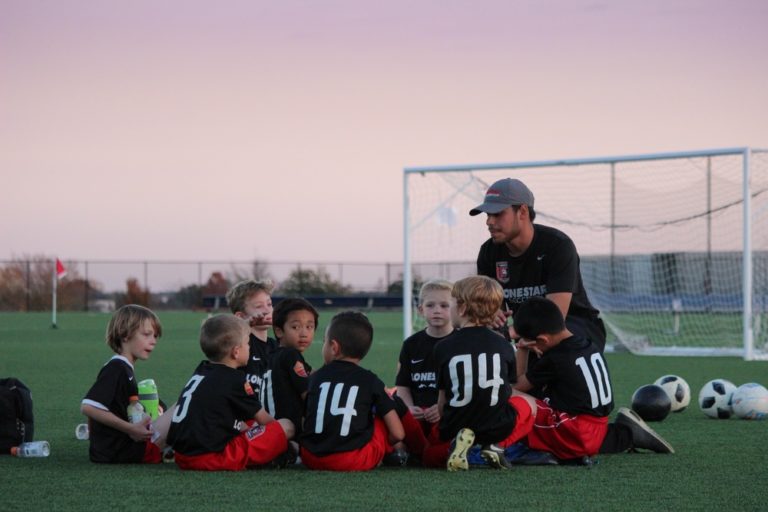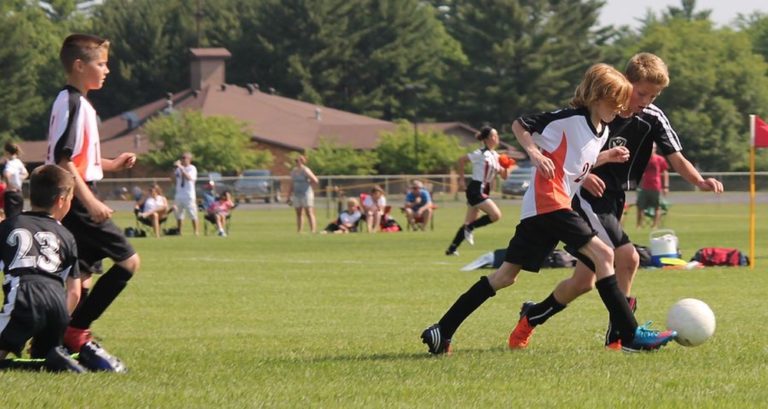Will My Child Be Bullied In Sports?


By Antoine G Larosiliere
I have four children who are all involved in sports, and I never realized I should find out: will my child be bullied in sports?
You’re probably wondering what I’m thinking- do we really have to worry about bullying everywhere we go? Unfortunately, Yes. Will my child be bullied in sports? There’s a good chance your child will witness or be subjected to physical bullying that can be prevalent on practice fields and games. Your child may also be subjected to repeated, unwanted trash-talking. Your child might face bullying from the physically advanced player who wants to intimidate others with his size or, the jealous player who lost playing time or, the team leader who lacks empathy and enjoys telling others what to do or, the gifted athletes who enjoy humiliating others. Some youth coaches might yell at, tease, humiliate and intimidate your child as well.
“Remember bullying is an unwanted, aggressive often repeated behavior that involves an imbalance of power.
Is it bullying or competitiveness?
Physical bullying is a form of bullying that is very prevalent on the practice field or during games. This includes, towel slapping, head butting and physical violence towards another player. But, what about when a defensive end tells the other team’s quarterback “I’m going to drill your punk @$# into the ground?” Is it bullying, competitiveness, or is he “just trying to get an edge?” Remember bullying is an unwanted, aggressive often repeated behavior that involves an imbalance of power. The attacked player must communicate that they don’t like the behavior. If the behavior continues to repeat, it’s not competitiveness or even “horse-playing,” it’s bullying.
Is it trash-talking or bullying?
One of the most common forms of bullying in sports is verbal bullying. Sometimes the lines between joking around with your teammates and bullying is blurred. When a player calls another player “buttercup” because they dropped a pass or, “Stevie Wonder” because you missed a wide open goal. Is it just “guys being guys?” Is it “trash-talking,” or bullying? The player being attacked verbally must communicate that they don’t like the behavior and the behavior must also happen more than once to establish that it’s bullying. So, yes! Repeated, unwanted trash-talking is bullying! According to Childhelp Speak Up Be Safe for Athletes article Blow the Whistle on Child Abuse, “40-50% of athletes have experienced anything from mild harassment to severe abuse in their sport of choice.”
Common examples of sports bullying include…
- Cyber threats and insults of players.
- Ganging up on team members because a team “leader” does not like them.
- Targeting a teammate because they get more attention and praise from the coach.
- Harassing a teammate because they appear to be the coach’s favorite.
- Attacking other teammates who are weaker players.
- Intimidating gifted teammates to eliminate the competition.
- Intimidating new teammates and forcing them to prove they belong on the team.
- Excoriating team members when they make a crucial mistake during the game.
- Threatening team members to not do well in games and practices.

Which kids are likely targeted?
For there to be a player “type” that is more susceptible to bullying is upsetting to even think about. That your child or someone else’s child fits a profile for them to be mistreated is appalling to me as a human being. But nonetheless, here are some general qualities of players that get targeted.
- Children who are overweight
- Children who are small
- Children who lack confidence
- Children who are poor performers
- Children who are gifted: the bullies are jealous and try to intimidate the gifted athletes into quitting to have more opportunity for themselves.
Will some coaches bully my child?
Some coaches may want to disregard it, calling it “tough love” instead of bullying. Some youth coaches yell at, tease, humiliate and intimidate the children they’re supposed to coach and bring the best out of. A 2009 study revealed that about 45% of teachers and 50% of coaches have behaved in a bullying manner towards students and athletes. In another research by Childhelp Speak Up Be Safe for Athletes, “4% of young athletes reported that a coach had hit, kicked, or slapped them. 8% of coaches acknowledged encouraging athletes to hurt opponents, and 33% yelled at players for making mistakes.” Some examples of when your child is being bullied by the coach are…
- Unreasonable performance demands on the player
- Threats to restrict their playing time
- Unwanted and unwarranted yelling and screaming at players
- Repeated criticism of players abilities
- Discounting or disregarding players accomplishments
- Blaming players for coaches mistakes
- Threats or actual violence towards players
How can a coach create an anti-bullying culture for the team?
Coaches are a catalyst for how kids on a team should treat one another. “At the beginning of the season I say: ‘If I hear you talk negatively about anyone on our team, anyone on other teams, or the referees, or umpires, you will sit,'” says youth sports coach Doug Donaldson, president of PlaySportsTV. They should..
- Make their message very clear that an atmosphere of respect is the standard.
- Place an emphasis on the team and create a “family” atmosphere.
- State clearly that no bullying will be tolerated under any circumstance.
- Create opportunities for off-the-field team activities to build stronger relationships.
Which type of players should we worry about?
Paul Coughlin, a sports dad and coach, says his son quit playing soccer because two of the kids on the team picked on his son repeatedly. “They made fun of his hair and what he was wearing,” he says, the bullies were physically advanced, and used that power to put other kids down, he says. “It was awful for us as parents. We felt powerless,” says Coughlin. Kirsten, a sports mom, says a group of jealous boys tried to beat up her son. They also stole his belongings, and damaged his belongings. The type of players parents, players and coaches might need to worry about are…
- The physically advanced player who wants to intimidate others with his size
- The jealous player who lost playing time
- The team leader who lacks empathy and enjoys telling others what to do
- The gifted athletes who enjoy humiliating others
How will this affect my child?
Bullying will surely hurt young athletes’ confidence in their chosen sports. To begin the process of helping your child, It’s important to notice the following signs.
- Your child’s behavior will change
- The player will lose confidence
- Your child complaining about stomach aches and other ailments to keep from going to practice or the game.
- The player will start performing poorly
- The player will play too cautiously
- The player will worry constantly about what the coach and teammates think
- The child can lose enjoyment for sports and drop out altogether
Questions to ask your child…
Communication with your child is imperative in a bullying situation. Most children will be too embarrassed to admit they’ve been bullied. Some children will be afraid of getting their teammates in trouble and become targeted even more. While others might be worried about bringing light to the situation may lead to less playing time. It’s important that your child trusts you enough to come to you. If they do, below are a few questions you should ask your child.
- Do you enjoy being on the team? Why or why not?
- Who are your close friends on the team and what are their names?
- Have you ever seen someone on the team being bullied or teased?
- Have you been bullied on the team by anyone?
- Have you ever bullied anyone on the team?
What can we do?
Bullying in sports hasn’t got as much attention as it should, but parents, educators and coaches can still benefit from more resources. If Your child is dealing with bullying on their sports team; here are a few suggestions that can help.
- Talk with your children.
- Invite some of the teammates over to your house and help your child cultivate friends.
- Give them some strategies to take control back from the bully.
- Enroll your child in martial arts classes, it helps build confidence.
- Reach out to the coach.
- Follow up.
- If the coach is unresponsive, express your concerns to the program director.
I hope this has been helpful! Many strategies including the one I just mentioned can also be found in the novel The Bully Experience: Daniel’s Story . Also subscribe to the YouTube channel for more insight to these topics.
The Bully Experience "Daniel's Story"

Sign up for our newsletter and Read the novel For Free!
Stay updated. Sign up for our newsletter, and get the first two chapters of The Bully Experience Daniel’s Story absolutely free.